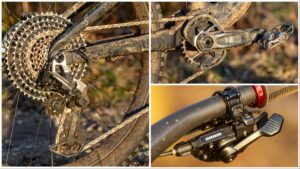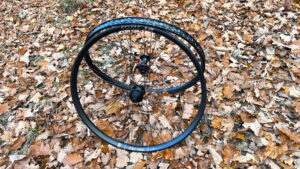OnOff AM Resin has a similar look to alloy Hook pedal with chamfered edge and same 12 pins per side, but it’s actually bigger, with a 105x105mm platform.
OnOff AM Resin Pedal review
The OnOff AM Resin pedal revolves on a standard cro-mo axle and, to keep the centre of the pedal as low as possible, it features a large inboard cartridge bearing. On the outside is another cartridge bearing and a mini needle roller. Normally I strip pedals down when I test them to check on the bearing quality and to see if they are truly what the company claims, but unfortunately, I didn’t have a socket long enough to get to the axle nut, which is buried quite deep in the platform. This could be an issue when you come to service them.
Read more: Best mountain bike flat pedals for 2021, metal and plastic
A resin or plastic pedal isn’t any lighter than one made from aluminium, but it is a lot cheaper, which is why we’ve seen a glut of them emerge over the last few years. Since most manufacturers have an established alloy pedal in the line it’s pretty easy to copy the shape, pin design and placement and, in some cases, even use the same axle and bearings.
The 5mm tall pins thread in from the back and are secured with a small nut. This two-piece design means you can remove them easily if you bend one, although I’ve found that if the impact is severe enough to bend a pin it’s usually enough to damage the plastic.
OnOff claims the OnOff AM Resin pedal has a 2mm convex profile, but I’ve measured it and it is totally flat front to back. You could, in theory, remove the centre pins to create a sort of concavity (it’s what some companies do), but if you have really sticky mountain bike shoes the pins usually sink in negating any effect. Although the target area is as big as a DMR Vault, I’d only rate the grip about average, but the reason why I can’t score it any higher is because there are better (and cheaper) resin pedals on the market, like the excellent Burgtec MK4 composite (£33.33) and HT PA03A (£39.99).
















